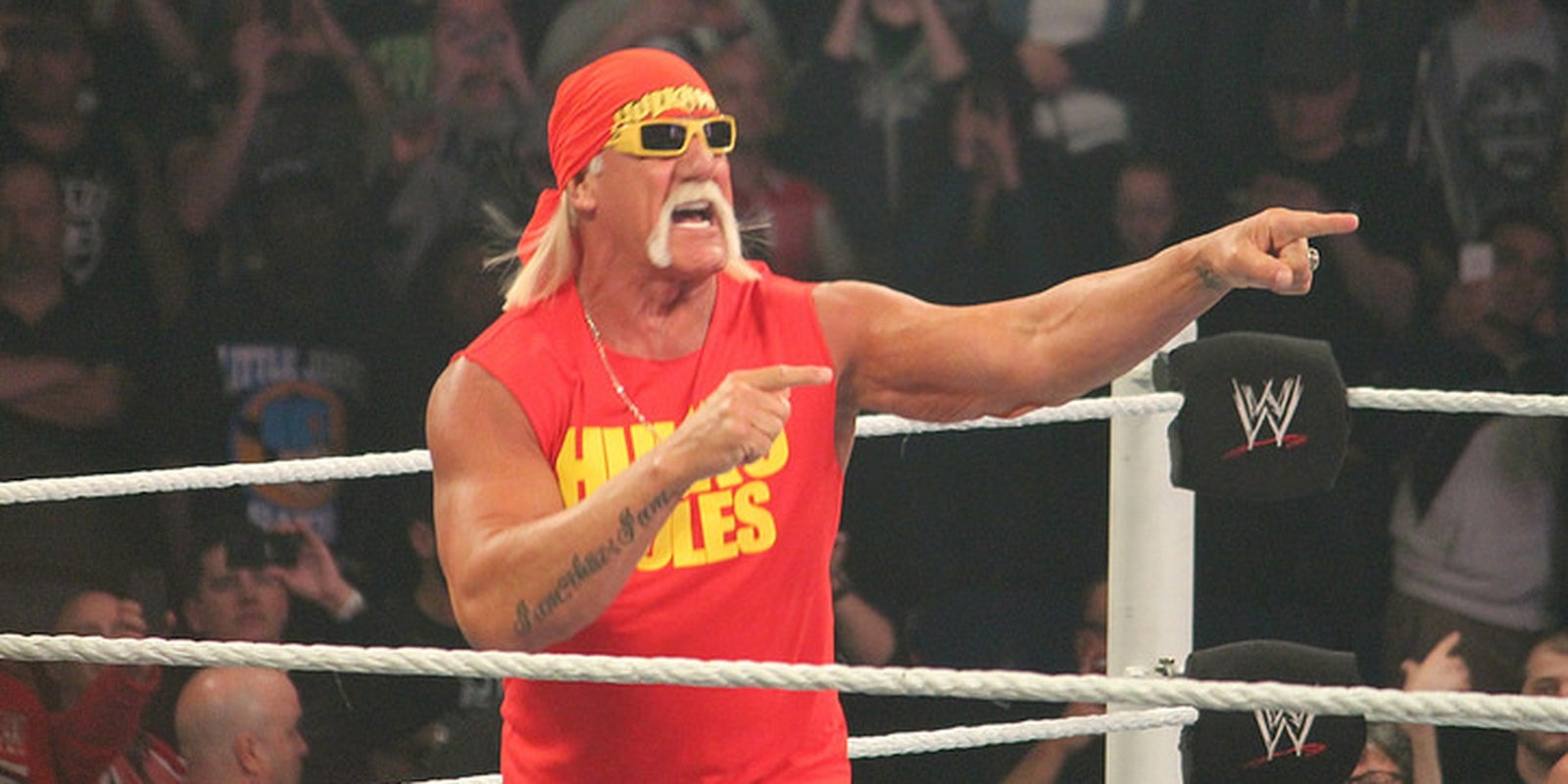An entertainment company that has long promoted racism and stereotypes just fired a longtime employee for a racist rant.
World Wrestling Entertainment severed ties with Hulk Hogan, real name Terry Bollea, and removed any online references to the legendary wrestler. The move followed reports of a leaked audio recording, in which Hogan can be heard describing fellow wrestler the Rock and black people as “n*ggers.” Hogan has since apologized, telling People magazine, “This is not who I am,” and that he disavows racism.
Although the WWE acted appropriately in firing Hogan, there is a strong irony that the company is taking such a moral stance on racism. In a statement about the incident, the company says it’s “committed to embracing and celebrating individuals from all backgrounds,” but they have actually been in the business of mocking and stereotyping people of color for decades.
Just 10 years ago, WWE chairman and CEO Vince McMahon used the N-word on camera at the 2005 Survivor Series event. In an awkward moment with McMahon and wrestler John Cena, McMahon asks Cena, “What’s good in the hood?” and then tells him to “Keep it up, my n*gga.” McMahon’s company managed to take a hard and fast stance on Hogan’s use of the word, but he faced no sanctions or backlash for his actions during the pay-per-view event.
However, McMahon isn’t the lone culprit in the WWE’s larger racism problem. Indeed, there’s a laundry list of other deplorable moments, and wrestling characters who help promote disgusting generalizations of race groups, especially of blacks and Latinos. In David Shoemaker’s The Squared Circle: Life, Death, and Professional Wrestling, the author highlighted the abundance of racism within the WWE’s history from the 1980s to the modern era—and, on the whole, the company hasn’t been made publicly accountable for it.
Mexicans have long been a routine target for unabashed stereotyping for the WWE, which was once known as the World Wrestling Federation. During an interview in the ‘80s, with a younger McMahon facilitating the banter, wrestler Don Muraco calls colleague Tito Santana a “wetback” and an “ignorant garbage picker” as Santana stands right beside him.
And in another archived clip, former wrestler and current WWE commentator John Layfield, also know as JBL, positions himself at the U.S.-Mexican border and waits for anyone attempting to cross. After launching into a rant about how undocumented immigrants are “lazy” and “take advantage of the healthcare [and] the welfare system,” JBL supposedly spots border-crossers and chases them off camera.
Aside from the entertainment brand’s problem with the N-word, they’ve also managed to green light many other displays of anti-black racism and prejudice on their programs. In a video containing an old episode of the WWE’s Raw series, Goldust steps out into the stadium, heading to a match in the ring against a black wrestler. With a lady on his arm, Goldust wears bell bottoms, a fur coat, thick gold chains, an afro, and was clad in blackface.
Many wrestlers find ways to taunt their opponents, yet this instance played on a historically demeaning representation of black people, while perpetuating a racialized, misogynist trope of the “pimp.” The ringside commentators make no mention of the problematic play, instead crediting the behavior to the wrestler’s “childhood problems” and an appreciation for the movie Jackie Brown.
Unfortunately, this is par for the course in the WWE, and has been for decades. When wrestlers and entertainers of color aren’t standing in the ring as an accessory to epithets and stereotypes, they’re cast into personas with racial caricatures and shticks. During the ‘90s and 2000s, several wrestling tag teams cropped up with names such as “Cryme Tyme” and the “Mexicools.” The former plays on black, urban men as thugs and criminals, while the latter were portrayed as lazy, unintelligent, and aloof immigrants working in service jobs.
And if the WWE can’t get people of color to dehumanize their own groups, they parcel out the dirty work to the many white men on the roster.
If WWE can’t get people of color to dehumanize their own groups, they parcel out the dirty work to the many white men on the roster.
In a 1988 segment, announcer Gene Okerlund delivers an on-camera update, live from what’s supposed to be an American ghetto. Supposedly, the wrestler known as “One Man Gang” is going through a transformation in his life, and Okerlund stands by ready to give an interview and bear witness. Before the big reveal, a black hype man donning a paperboy hat, grey suit, and a boombox briefly speaks with Okerlund to herald the (white) wrestler’s new persona: “Akeem the African Dream.”
Soon after, music plays with tribal percussion, and the camera pans out to a group of actors cast as African tribespeople, all of whom dance around a garbage can fire. Okerlund then quips that he’ll have to “re-up his subscription of National Geographic,” and that Akeem’s story could be a PBS special—because black people and, by extension, Africans are seen as savage and animalistic in the eyes of many voyeuristic white Westerners. It doesn’t end there, as the white wrestler culturally appropriates with a dashiki and traditional head adornment, affecting an accent of an African-born person who speaks English as a second language.
But somehow, all it took was one instance of Hulk Hogan using the N-word for the WWE to fire him, and position itself as an exemplar of diversity and inclusion.
The entertainment company has managed over the years to rake in hundreds of millions of dollars, dodging any public accountability for profiting off racial stereotypes. When the entire enterprise has consistently, blatantly disrespected people of color for decades, it should surprise no one that one of the WWE’s most beloved wrestlers is a bona fide racist.
Erick Fernandez is a freelance writer focusing on the intersection of sports and culture. He has previously written for Sports Illustrated, the Guardian, Bleacher Report, and Mic. Follow him on Twitter, @ErickFernandez.
Photo via ohhsnap_mee/Flickr (CC BY SA 2.0)


